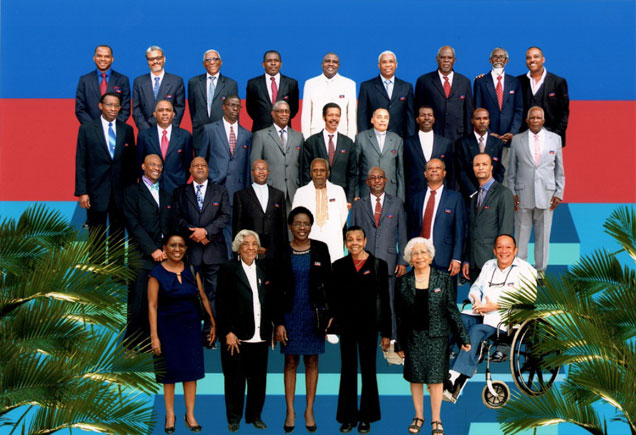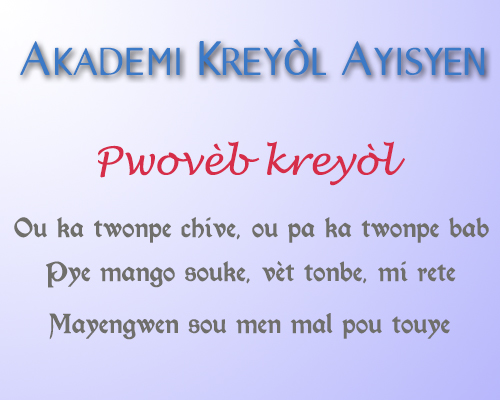The Haitian Creole Program at Tulane offers students the possibility to develop linguistic and cultural competencies in the language spoken in Haiti as well as other creolophone speech communities such as Martinique and Guadeloupe.

The principle that undergirds the Haitian Creole courses aligns with the ACTFL Proficiency Guidelines for Foreign Language Teaching as well as the Common European Framework for Reference Languages (CEFR) that emphasizes plurilingualism as a necessary step in subject development in the contemporary world. Going beyond multilingualism, the CEFR argues that a speaking subject who properly develops competencies in several languages “does not keep these languages and cultures in strictly separated mental compartments, but rather builds up a communicative competence to which all knowledge and experience of language contributes, and in which languages interrelate and interact” (CEFR 4). Drawing on this, our goal is to create an environment in which students feel comfortable to learn Haitian Creole, express their ideas and work with others. In addition to fulfilling Tulane’s Foreign Language Requirement, Global Perspectives requirement, and the accumulation of regular credits toward their graduation, the Program provides opportunities for students to:

- Learn about the language and culture of the first independent nation in Latin America / the Caribbean and the second independent nation in the American Continent.
- Understand the struggle of Haitian people and other creolophone speech communities through the Creole language.
- Learn about Haitian culture, food, and music, as well as Haiti’s unique blend of African and French heritage as well the Haitian Creole Academy.
- Acquire linguistic and cultural competencies that can ultimately lead to service learning in the Haitian community in New Orleans, in the Caribbean, at the Haitian Consulates in New York, Miami, Chicago, Boston, Montreal, or the Dominican Republic, and in Haitian community organizations throughout the US, Canada, the DR, and France.
- Conduct research in Haiti.
- Apply for fellowships in Haiti.
- Study the historically uneasy relationship between Haiti and Dominican Republic via a summer study abroad with the Haitian community in the DR.
The Creole program at Tulane offers three full academic semesters of Haitian Creole language. Each course is worh four credits. Students can fullfill Tulane’s Foreign Language Requirements by taking all three courses for a total of twelve credits.

HACR 1010. The first semester of Haitian Creole (Elementary Haitian Creole I) is designed for students with little or no knowledge of Haitian Creole. This course introduces students to the language and the culture of the Creole speech community of the francophone Caribbean region with emphasis on the Haitian speech community. Students will acquire robust competencies in Haitian Creole that prepare them for more advanced studies in Haitian language and culture.
HACR 1010 emphasizes the development of multiple language skills (including listening, speaking, reading, writing, as well as interacting) as a way to help students reach the instructional goals of the class. Communicative contexts and grammatical features of the language are introduced in class through a variety of activities. Acquisition is reinforced by interactive use of new structures and vocabulary.
On completion of HACR 1010, students will have acquired the basic skills necessary to interact with Creole speakers and will have attained a strong grammatical foundation in the Creole language. With regard to standardized measurements, students will have attained a level of proficiency in Haitian Creole that is comparable to the level of Novice High of the ACTFL OPI. Details about these levels of proficiency can be found on the ACTFL website. Additionally, given the mutual intelligibility that often exists between Haitian Creole and other Creole languages, particularly the Creole languages that have developed in historical dominated French societies, developing skills in Haitian Creole might also contribute to a significant understanding of these Creole languages if the need arises.

HACR 1020. The second semester of Haitian Creole (Elementary Haitian Creole II) is designed to allow students to develop intermediate level of competencies in Haitian Creole. It is intended for students who have taken HACR 1010 or who have already acquired some competencies in Haitian Creole (e.g. high school, or junior college, or exposure to Creole at home or abroad). Our goal is to create an environment in which students feel comfortable to learn Haitian Creole, express their ideas and work with others, develop interest in Haitian Creole as a foreign language, and be ready for more advanced courses in the language.
In this course, students build on skills acquired in HACR to further develop multiple language skills (listening, speaking, reading, writing, as well as interacting). In order to reach the specified goals of the course, students are exposed to more complex sentences, longer texts, and more complex grammatical structures. They also develop skills to participate in conversations related to real events in Haiti and other creolophone speech communities and improve their ability to write longer and better papers. Communicative contexts and grammatical guides are introduced in class through a variety of activities and acquisition is reinforced by interactive use of new structures and vocabulary.
With regard to standardized measurements, students will have attained a level of proficiency in Haitian Creole that is comparable to the Intermediate High level in the ACTFL OPI assessment. Details about these levels of proficiency can be obtained as a PDF on the ACTFL.org website. Additionally, given the mutual intelligibility that often exists between Haitian Creole and other Creole languages, particularly the Creole languages that have been developed in historically dominated French societies, this class will further offer students the opportunity to foster a more significant understanding of these Creole languages if the need arises.
HACR 2030. The primary goal of this course, Intermediate Haitian Creole, is to allow students to develop skills to perform, at least, at the Advanced Low Level in Haitian Creole. Taught in Haitian Creole, this class is designed for students who have already taken two semesters of Haitian Creole or who have been exposed to the language.

Our main objective in this course is to develop ease, fluidity, and efficiency in oral and written expressions. Typically, students at this level demonstrate textual/writing ability beyond the sentence level. This class provides a broad introduction to Haitian culture, history, social practices, literature and literary styles through the study of excerpts from fiction and non-fiction works. We review and deepen selected grammatical structures in coordination with topics and activities taught in class. The readings, the audio materials, and discussions seek to improve the students’ reading and comprehension skills and the required oral presentations and written assignments seek to develop writing and communication skills in Creole. We consider language as part of social practices. Consequently, interaction is a key component in the enactment of the pedagogical practices in this course. In this case, this course intends to encourage students to use the language in real time. Some of the materials used in our recent HACR 2030 course include Pierre Baudelaire's novel Testaman, Yves Dejean's bookYon Lekòl Tèt Anba nan yon peyi Tèt Anba, Maurice Sixto's collection of short stories, and a series of radio shows on the history of Haiti by renown Haitian historians.
Upon the completion of this course, students usually acquire advanced skills in reading, writing, listening, speaking, and interaction fluencies in Haitian Creole that allow them to perform at the Advanced Low Level in the language. They also develop a more sustained understanding of Haitian history and culture. To measure the outcomes stated above, each student is required to execute and submit a short conversation with a Haitian Creole speaker 5 times during the semester (this counts for 20% of the grade).

